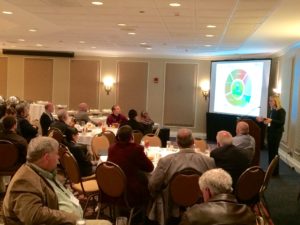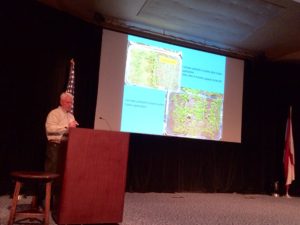by Danilo Gusmão de Quadros* (Advanced Biofuels USA) After two days (February 2-3, 2015) in “Sweet Home Alabama” at Auburn University, we got overwhelmed with the most recent discoveries of cutting-edge research that were presented there. But which novelties will be applicable to the biomass industry?
To show that, I divided this article into two segments: advances in feedstock production systems and new technologies for biomass conversion into biofuels and chemicals.
Feedstock production systems
Herbaceous plants should be the key feedstock supplies to fill the Energy Independence and Security Act (EISA) goals for the next years, considering projections for corn ethanol, residues and wood. In this context, the Southeast seems to be the land of milk and honey to grow dedicated crops for bioenergy and biofuels.
Plant breeding and selection have an important role in the development of new cultivars specific to this region.
New varieties of sweet sorghum, which are more productive, sweeter, tolerant to water stress or flooding, and resistant to diseases have been researched to supply easily convertible sugar.
Switchgrass, the native grass most studied for biomass, is a reliable source of biomass which brings direct environmental benefits and has social acceptance, despite only medium economic performance.
Thinking of diversity, giant miscanthus should be considered in the system. Many tests have been conducted to evaluate establishment, yield, harvest, storage, and transportation. The costs are currently acceptable.
New ways to manage biofuel crops are important to a sustainable biomass system. Elephantgrass and energy cane are prominents to be explored in low productivity lands (previously called “marginal lands”). In these areas, low input and high yield can be achieved by the use of legumes intercropped, like winter clovers, keeping the production more constant over the years and bringing environmental benefits, considering soil organic carbon (SOC) and greenhouse gases (GHG).
 Genera Energy's CEO, Kelley Tiller gave a great motivational speech, "Surf's up! The Academic's Guide to Surfing the Bioeconomy Wave."
Genera Energy's CEO, Kelley Tiller gave a great motivational speech, "Surf's up! The Academic's Guide to Surfing the Bioeconomy Wave."
Brassica catarinata has special non-edible oil composition favorable to producing jetfuel, increasing selling prices and arousing the interest of aviation companies committed to reducing the carbon footprint of each mile flown.
Not too much was talked about harvesting. But some insights from Genera Energy showed biomass sorghum's high yield varieties being dried down and baled with new machines, improving the logistics and storage. Pile storage of chopped material also has been tested and, after 150 days, the results are impressive.
A lot of attention was given to woody biomass at the conference. First, in the Southeast, 60% of the land area is woody biomass, half being planted and half naturally regenerated. It means a lot of residue. This fostered an established paper mill industry and new pellet companies. The next focus will be in short-rotational wood, like hybrid poplar, black willow, eucalyptus, and populus. Furthermore, new management and practices can enhance the profitability of loblolly pine.
Intercropping trees and grasses with techniques to mitigate competition might capitalize the area.
To be part of the supply system, the biomass source should be reliable, with low cost and high quality. Diversification is a relevant point that is favorable in the Southeast.
A Billion Ton Update, which will be release in June of 2016, is going to bring additional information about feedstock supply, prices, costs of transportation, and impacts regarding sustainability and carbon implications (climate change impacts, SOC, water quantity and quality, air quality, and biodiversity). For the first time, algae will be included.
One point that really got my attention was the development of models. According to Dr. George E.P. Box (1919-2013), “essentially, all models are wrong, but some are useful.” These tools are very important in the biomass supply chain scenario. More and more complete models have been used for, among others: cost evaluation, transportation and logistics aspects analysis, integrating biomass with spatial distribution (http://www.biosat.net), life cycle assessment (LCA) evaluation, and calculating sustainable indexes. Put all the factors together, the models are extremely helpful to decision making.
The University of Tennessee, along with multiple academic and industrial partners, presented IBSS – The Southeastern Partnership for Integrated Biomass Supply Systems (http://www.se-ibss.org). IBSS demonstrates real-world solutions towards economically and environmentally sustainable production and conversion of biomass-to-biofuel in the Southeast. This Partnership is helping to meet the USDA goal of producing almost 50% of the next generation of biofuels in the Southeast, while supporting robust and innovative research, education and extension activities. Learn more about IBSS in the Dr. Timothy Rials’ exclusive interview below.
Biofuels and chemicals
Thermochemical platforms show flexibility to convert more easily large kinds of feedstocks though pyrolysis and gasification. Catalytic processes have been studied to get the best conversion rates. Bio-oils have become an increasingly popular conversion technique to produce fuel and chemicals from biomass. In addition, using syngas through Fischer-Tropsch processes produces liquid fuels.
Biochemical platforms have advanced in many ways for pretreatment practices and new strains for co-culture for bath and continuous fermentation.
Lignin, obtained in the process of separation of plant cell-wall components, has been burned in all important lignocellullosic based biofuel operations. However, there are many other uses such as a base for chemicals to supply polymers. The value of these products may be high enough to stimulate the evaluation of conversion techniques to obtain not just fuel yield from plant cell walls, but also to encourage recovery of reasonable percentages and purity of lignin.
Also, chemical products facing volatile oil prices are integral to increasing profits. First, this market is increasing following a consistent sustainability trend. Second, compared with bioethanol from corn, renewable chemicals have not been demonized in “food vs. fuel” debates. Finally, biobased components add value to brands and therefore are desired by companies responding to consumers’ behavior and buying power.
An example of this is the successful hybrid methodology chemical/biochemical, which is used to generate new platform chemicals from biorefinery sugars, and subsequently transform them into new biobased polymers and material.
Novel uses
Genetic treatment of patients can be made using lignin nanotubes, substituting for very expansive cellulosic material. Recent studies showed the body and the cells accepted the component, depositing DNA, for example, to regenerate liver tissue. Moreover, strategies that integrate lignin with conventional polymers could offer new materials for generating smart polymers designed to have advanced functionality such as healing, external stimuli response and shape-memory function.
Utilizing extractives portion of switchgrass (chemical compounds that during biomass pretreatment inhibit enzymes and yeasts involved in saccharification and fermentation) as antimicrobials, biopesticides, and anti-inflammatory agents would add value to this biomass.
More information about the Sun Grant Initiative
http://www.sungrant.org - The Sun Grant Initiative is a national network of land-grant universities and federally funded laboratories working together to further establish a biobased economy. Congress authorized the Sun Grant Initiative in the 2002 and 2008 Farm Bills. Sun Grant efforts are supported with funds from the U.S. Departments of Energy, Agriculture and Transportation.
http://bioweb.sungrant.org - The Sun Grant BioWeb is a non-commercial, educational website that provides current information about using biomass resources for bioenergy and bioproducts.
Interview
To get valuable information about biofuels research, how to advance in feedstock supply systems, and much more, listen to the exclusive interview of Dr. Timothy Rials, conducted by Dan Quadros. Don’t miss the opportunity to know about IBSS – Southeastern Partnership for Integrated Biomass Supply Systems.
Dr. Timothy Rials was a Professor at the University of California-Berkeley, conducting research on renewable materials; also a research scientist in USDA-Forest Service, Southern Research Station in Pineville, LA, experimenting around wood-polymer interfacial properties and adhesion. Currently, Tim is a Professor at The University of Tennessee, developing research in vibrational spectroscopy of wood and related materials. Since 2005, he has been a director for the Southeast Sun Grant Center, effectively broadening the research effort to consider bioenergy and bio-based products. A fellow in the International Academy of Wood Science and member of the American Chemical Society, Tim continues working to advance the efficient use of wood and biomass to strengthen the bioeconomy in Tennessee and the Southeast.
1 – What is the role of Universities in bioenergy and biofuels research in the US?
2 – How to advance in energy crop supply systems?
3 – Is the Southeast the best region for herbaceous dedicated crops?
4 – Could you make a comparison among different technologies to convert biomass in biofuels?
5 – How to reduce the risk in feedstock supply?
6 – Considering the impact of oil prices on the biofuels industry, in the long-term what will be the consolidation of this industry facing so fluctuating crude oil market?
7 – How to deal with heterogeneity in feedstock composition?
8 – How do you evaluate logistic challenges on biorefinary functionality and profitability?
9 – Could you tell us about IBSS? How this project is relating to deploy biomass industry in the Southeast?
10- There are a lot of small landowners in the Southeast. Considering the biomass industry, how to get these people involved in the process and get real benefits?
* Research Scholar at University of Florida and Volunteer at Advanced Biofuels U.S.A
Photos by Dan Quadros
Nearly 55,000 articles in our online library!
Use the categories and tags listed below to access the nearly 50,000 articles indexed on this website.
Advanced Biofuels USA Policy Statements and Handouts!
- For Kids: Carbon Cycle Puzzle Page
- Why Ethanol? Why E85?
- Just A Minute 3-5 Minute Educational Videos
- 30/30 Online Presentations
- “Disappearing” Carbon Tax for Non-Renewable Fuels
- What’s the Difference between Biodiesel and Renewable (Green) Diesel? 2020 revision
- How to De-Fossilize Your Fleet: Suggestions for Fleet Managers Working on Sustainability Programs
- New Engine Technologies Could Produce Similar Mileage for All Ethanol Fuel Mixtures
- Action Plan for a Sustainable Advanced Biofuel Economy
- The Interaction of the Clean Air Act, California’s CAA Waiver, Corporate Average Fuel Economy Standards, Renewable Fuel Standards and California’s Low Carbon Fuel Standard
- Latest Data on Fuel Mileage and GHG Benefits of E30
- What Can I Do?
Donate
DonateARCHIVES
- March 2026
- February 2026
- January 2026
- December 2025
- November 2025
- October 2025
- September 2025
- August 2025
- July 2025
- June 2025
- May 2025
- April 2025
- March 2025
- February 2025
- January 2025
- December 2024
- November 2024
- October 2024
- September 2024
- August 2024
- July 2024
- June 2024
- May 2024
- April 2024
- March 2024
- February 2024
- January 2024
- December 2023
- November 2023
- October 2023
- September 2023
- August 2023
- July 2023
- June 2023
- May 2023
- April 2023
- March 2023
- February 2023
- January 2023
- December 2022
- November 2022
- October 2022
- September 2022
- August 2022
- July 2022
- June 2022
- May 2022
- April 2022
- March 2022
- February 2022
- January 2022
- December 2021
- November 2021
- October 2021
- September 2021
- August 2021
- July 2021
- June 2021
- May 2021
- April 2021
- March 2021
- February 2021
- January 2021
- December 2020
- November 2020
- October 2020
- September 2020
- August 2020
- July 2020
- June 2020
- May 2020
- April 2020
- March 2020
- February 2020
- January 2020
- December 2019
- November 2019
- October 2019
- September 2019
- August 2019
- July 2019
- June 2019
- May 2019
- April 2019
- March 2019
- February 2019
- January 2019
- December 2018
- November 2018
- October 2018
- September 2018
- August 2018
- July 2018
- June 2018
- May 2018
- April 2018
- March 2018
- February 2018
- January 2018
- December 2017
- November 2017
- October 2017
- September 2017
- August 2017
- July 2017
- June 2017
- May 2017
- April 2017
- March 2017
- February 2017
- January 2017
- December 2016
- November 2016
- October 2016
- September 2016
- August 2016
- July 2016
- June 2016
- May 2016
- April 2016
- March 2016
- February 2016
- January 2016
- December 2015
- November 2015
- October 2015
- September 2015
- August 2015
- July 2015
- June 2015
- May 2015
- April 2015
- March 2015
- February 2015
- January 2015
- December 2014
- November 2014
- October 2014
- September 2014
- August 2014
- July 2014
- June 2014
- May 2014
- April 2014
- March 2014
- February 2014
- January 2014
- December 2013
- November 2013
- October 2013
- September 2013
- August 2013
- July 2013
- June 2013
- May 2013
- April 2013
- March 2013
- February 2013
- January 2013
- December 2012
- November 2012
- October 2012
- September 2012
- August 2012
- July 2012
- June 2012
- May 2012
- April 2012
- March 2012
- February 2012
- January 2012
- December 2011
- November 2011
- October 2011
- September 2011
- August 2011
- July 2011
- June 2011
- May 2011
- April 2011
- March 2011
- February 2011
- January 2011
- December 2010
- November 2010
- October 2010
- September 2010
- August 2010
- July 2010
- June 2010
- May 2010
- April 2010
- March 2010
- February 2010
- January 2010
- December 2009
- November 2009
- October 2009
- September 2009
- August 2009
- July 2009
- June 2009
- May 2009
- April 2009
- March 2009
- February 2009
- January 2009
- December 2008
- November 2008
- October 2008
- September 2008
- August 2008
- July 2008
- June 2008
- May 2008
- April 2008
- March 2008
- February 2008
- January 2008
- December 2007
- November 2007
- October 2007
- September 2007
- August 2007
- June 2007
- February 2007
- January 2007
- October 2006
- April 2006
- January 2006
- April 2005
- December 2004
- November 2004
- December 1987
CATEGORIES
- About Us
- Advanced Biofuels Call to Action
- Aviation Fuel/Sustainable Aviation Fuel (SAF)
- BioChemicals/Renewable Chemicals
- BioRefineries/Renewable Fuel Production
- Business News/Analysis
- Cooking Fuel
- Education
- 30/30 Online Presentations
- Competitions, Contests
- Earth Day 2021
- Earth Day 2022
- Earth Day 2023
- Earth Day 2024
- Earth Day 2025
- Executive Training
- Featured Study Programs
- Instagram TikTok Short Videos
- Internships
- Just a Minute
- K-12 Activities
- Mechanics training
- Online Courses
- Podcasts
- Scholarships/Fellowships
- Teacher Resources
- Technical Training
- Technician Training
- University/College Programs
- Events
- Coming Events
- Completed Events
- More Coming Events
- Requests for Speakers, Presentations, Posters
- Requests for Speakers, Presentations, Posters Completed
- Webinars/Online
- Webinars/Online Completed; often available on-demand
- Federal Agency/Executive Branch
- Agency for International Development (USAID)
- Agriculture (USDA)
- Commerce Department
- Commodity Futures Trading Commission
- Congressional Budget Office
- Defense (DOD)
- Air Force
- Army
- DARPA (Defense Advance Research Projects Agency)
- Defense Logistics Agency
- Marines
- Navy
- Education Department
- Energy (DOE)
- Environmental Protection Agency
- Federal Energy Regulatory Commission (FERC)
- Federal Reserve System
- Federal Trade Commission
- Food and Drug Administration
- General Services Administration
- Government Accountability Office (GAO)
- Health and Human Services (HHS)
- Homeland Security
- Housing and Urban Development (HUD)
- Interior Department
- International Trade Commission
- Joint Office of Energy and Transportation
- Justice (DOJ)
- Labor Department
- National Academies of Sciences Engineering Medicine
- National Aeronautics and Space Administration
- National Oceanic and Atmospheric Administration
- National Research Council
- National Science Foundation
- National Transportation Safety Board (NTSB)
- Occupational Safety and Health Administration
- Overseas Private Investment Corporation
- Patent and Trademark Office
- Securities and Exchange Commission
- State Department
- Surface Transportation Board
- Transportation (DOT)
- Federal Aviation Administration
- National Highway Traffic Safety Administration (NHTSA)
- Pipeline and Hazardous Materials Safety Admin (PHMSA)
- Treasury Department
- U.S. Trade Representative (USTR)
- White House
- Federal Legislation
- Federal Litigation
- Federal Regulation
- Feedstocks
- Agriculture/Food Processing Residues nonfield crop
- Alcohol/Ethanol/Isobutanol
- Algae/Other Aquatic Organisms/Seaweed
- Atmosphere
- Carbon Dioxide (CO2)
- Field/Orchard/Plantation Crops/Residues
- Forestry/Wood/Residues/Waste
- hydrogen
- Manure
- Methane/Biogas
- methanol/bio-/renewable methanol
- Not Agriculture
- RFNBO (Renewable Fuels of Non-Biological Origin)
- Seawater
- Sugars
- water
- Funding/Financing/Investing
- grants
- Green Jobs
- Green Racing
- Health Concerns/Benefits
- Heating Oil/Fuel
- History of Advanced Biofuels
- Infrastructure
- Aggregation
- Biofuels Engine Design
- Biorefinery/Fuel Production Infrastructure
- Carbon Capture/Storage/Use
- certification
- Deliver Dispense
- Farming/Growing
- Precursors/Biointermediates
- Preprocessing
- Pretreatment
- Terminals Transport Pipelines
- International
- Abu Dhabi
- Afghanistan
- Africa
- Albania
- Algeria
- Angola
- Antarctica
- Arctic
- Argentina
- Armenia
- Aruba
- Asia
- Asia Pacific
- Australia
- Austria
- Azerbaijan
- Bahamas
- Bahrain
- Bangladesh
- Barbados
- Belarus
- Belgium
- Belize
- Benin
- Bermuda
- Bhutan
- Bolivia
- Bosnia and Herzegovina
- Botswana
- Brazil
- Brunei
- Bulgaria
- Burkina Faso
- Burundi
- Cambodia
- Cameroon
- Canada
- Canary Islands
- Caribbean
- Central African Republic
- Central America
- Chad
- Chile
- China
- Colombia
- Congo
- Congo, Democratic Republic of
- Costa Rica
- Croatia
- Cuba
- Cyprus
- Czech Republic
- Denmark
- Dominican Republic
- Dubai
- Ecuador
- Egypt
- El Salvador
- Equatorial Guinea
- Estonia
- Eswatini/Swaziland
- Ethiopia
- European Union (EU)
- Fiji
- Finland
- France
- French Guiana
- Gabon
- Georgia
- Germany
- Ghana
- Global South
- Greece
- Greenland
- Grenada
- Guatemala
- Guinea
- Guyana
- Haiti
- Honduras
- Hong Kong
- Hungary
- Iceland
- India
- Indonesia
- Iran
- Iraq
- Ireland
- Israel
- Italy
- Ivory Coast
- Jamaica
- Japan
- Jersey
- Jordan
- Kazakhstan
- Kenya
- Korea
- Kosovo
- Kuwait
- Laos
- Latin America
- Latvia
- Lebanon
- Liberia
- Lithuania
- Luxembourg
- Macedonia
- Madagascar
- Malawi
- Malaysia
- Maldives
- Mali
- Malta
- Marshall Islands
- Mauritania
- Mauritius
- Mexico
- Middle East
- Moldova
- Monaco
- Mongolia
- Morocco
- Mozambique
- Myanmar/Burma
- Namibia
- Nepal
- Netherlands
- New Guinea
- New Zealand
- Nicaragua
- Niger
- Nigeria
- North Africa
- North America
- North Korea
- Northern Ireland
- Norway
- Oman
- Pakistan
- Panama
- Papua New Guinea
- Paraguay
- Peru
- Philippines
- Poland
- Portugal
- Qatar
- Republic of
- Romania
- Russia
- Rwanda
- Saudi Arabia
- Scotland
- Senegal
- Serbia
- Sierra Leone
- Singapore
- Slovakia/Slovak Republic
- Slovenia
- Solomon Islands
- South Africa
- South America
- South Korea (Republic of Korea)
- South Sudan
- Southeast Asia
- Spain
- Sri Lanka
- Sudan
- Suriname
- Sweden
- Switzerland
- Taiwan
- Tanzania
- Thailand
- Timor-Leste
- Togo
- Trinidad and Tobago
- Tunisia
- Turkey
- Uganda
- UK (United Kingdom)
- Ukraine
- United Arab Emirates UAE
- Uruguay
- Uzbekistan
- Vatican
- Venezuela
- Vietnam
- Wales
- Zambia
- Zanzibar
- Zimbabwe
- Marine/Boat Bio and Renewable Fuel/MGO/MDO/SMF
- Marketing/Market Forces and Sales
- Opinions
- Organizations
- Original Writing, Opinions Advanced Biofuels USA
- Policy
- Presentations
- Biofuels Digest Conferences
- DOE Conferences
- Bioeconomy 2017
- Bioenergy2015
- Biomass2008
- Biomass2009
- Biomass2010
- Biomass2011
- Biomass2012
- Biomass2013
- Biomass2014
- DOE Project Peer Review
- Other Conferences/Events
- R & D Focus
- Carbon Capture/Storage/Use
- Co-Products
- Feedstock
- Logistics
- Performance
- Process
- Vehicle/Engine/Motor/Aircraft/Boiler/Ship
- Yeast
- Railroad/Train/Locomotive Fuel
- Resources
- Books Web Sites etc
- Business
- Definition of Advanced Biofuels
- Find Stuff
- Government Resources
- Scientific Resources
- Technical Resources
- Tools/Decision-Making
- Rocket/Missile Fuel
- Sponsors
- States
- Alabama
- Alaska
- Arizona
- Arkansas
- California
- Colorado
- Connecticut
- Delaware
- Florida
- Georgia
- Hawai'i
- Idaho
- Illinois
- Indiana
- Iowa
- Kansas
- Kentucky
- Louisiana
- Maine
- Maryland
- Massachusetts
- Michigan
- Midwest
- Minnesota
- Mississippi
- Missouri
- Montana
- Native American tribal nation lands
- Nebraska
- Nevada
- New Hampshire
- New Jersey
- New Mexico
- New York
- North Carolina
- North Dakota
- Ohio
- Oklahoma
- Oregon
- Pennsylvania
- Puerto Rico
- Rhode Island
- South Carolina
- South Dakota
- Tennessee
- Texas
- Utah
- Vermont
- Virginia
- Washington
- Washington DC
- West Coast
- West Virginia
- Wisconsin
- Wyoming
- Sustainability
- Uncategorized
- What You Can Do
tags
© 2008-2023 Copyright Advanced BioFuels USA. All Rights reserved.




.jpg)





0 COMMENTS
Leave A Comment
Your Email Address wiil not be Published. Required Field Are marked*